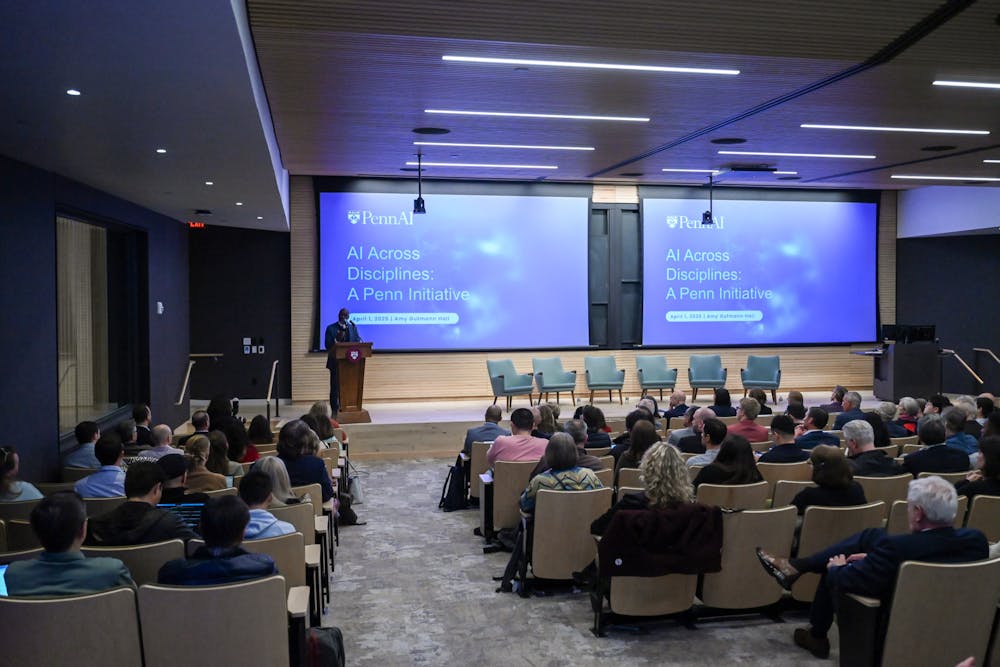
“ChatGPT can teach better than me.” These are the words of School of Engineering and Applied Science professor Robert Ghrist, who confidently admitted that in spite of his years of studying mathematics, the artificial intelligence-based chatbot could teach it to students better than he could.
Ever since ChatGPT was released in 2022, the floodgates have been open; generative AI has now seeped into everyday life. Yet, many university administrators and students continue to resist AI, arguing that it will degrade our ability to think and learn.
I beg to differ. It seems that instead of limiting AI, Penn should embrace it in order to augment learning.
AI is better and faster at breaking down material — plain and simple. With all the information on the internet, chatbots like ChatGPT can find virtually any piece of information you might need. These tools have an infinite number of prompts that you can use to tailor your explanation just as you please, whether that be a simple explanation or one that goes into the nuts and bolts of a complex problem.
AI can even format information in note-ready form so you don’t have to transcribe what your professor writes. A study done on a Harvard University physics class found that students in the class who were given access to an AI tutor learned twice as much as those who only had in-class instruction. This is not to say that professors don’t have a vast knowledge of their subject, only that they simply do not have the bandwidth to break it down in the multitude of ways a chatbot can.
Many who oppose the tidal wave of AI rolling into universities argue that AI precludes us from wrestling with deep ideas by allowing students to skim readings and summarizing corpuses of text in seconds. But wait: Haven’t students been avoiding this so-called intellectual strain for centuries? Before chatbots, you could have just asked a friend for the answers to a problem set the night before. Sites like Chegg and Sparknotes — where students could get a summary of all the major points of a novel in mere minutes — already existed. While the means to do so have definitely improved, if a student didn’t really want to wrestle with the ideas of a course in the past, they quite simply didn’t have to — the only difference is it may have taken them a little longer to embark on a so-called intellectual shortcut.
More importantly, this means the amount of effort a student puts in has always been the student’s choice. If you find a course stimulating, you may take the time to refine your knowledge on the material. If not — which, let’s be honest, is almost always the case — then the path of least resistance seems to be the way to go.
The use of AI will not change this fundamental axiom.
There is a more philosophical argument to be made that AI prevents us from learning basic skills such as critical reading and writing. In essence, AI will make all information so easily explainable that we will never have to develop these skills. However, it seems hard to say that one form of knowledge is intrinsically better or more necessary to be learned than another. For instance, less people today know how to grow their own food than ever, yet food is one of the most integral pieces of our sustenance.
The skills we learn should mold themselves to the tasks that are relevant in this day and age. And for those who still worry about the utility of basic skills, those skills are unlikely to go anywhere. Calculators were invented roughly 50 years ago, yet math education has been strengthened since then. Skills like these will always be taught because they serve as a baseline for more arduous academic pursuits — a means to learn how to think. If anything, AI will only lower the barrier to entry for baseline skills such as math and reading, which is all the more necessary considering that 54% of adults cannot read at a sixth grade level in the United States.
So where does that leave professors? Instead of replacing professors with AI, they can focus more on generating curricula that foster creativity and passion along with all the grinding work that needs to be done for a given subject. AI can also handle copious amounts of administrative tasks, which will free up time drawing up more engaging curricula.
ROSHAN GOPAL is a College first year from New York studying mathematics. His email is rgopal@sas.upenn.edu.
The Daily Pennsylvanian is an independent, student-run newspaper. Please consider making a donation to support the coverage that shapes the University. Your generosity ensures a future of strong journalism at Penn.
Donate







